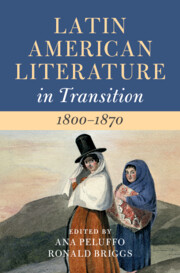Book contents
- Latin American Literature in Transition 1800–1870
- Latin American Literature in Transition
- Latin American Literature in Transition 1800–1870
- Copyright page
- Contents
- Figures
- Contributors
- Acknowledgments
- Introduction
- Part I Aesthetics of Disorder
- Part II Affective Communities
- Chapter 8 Imagining Popular Sovereignty
- Chapter 9 The Arithmetic of Sentiment
- Chapter 10 Costumbrismo As Political Ethnography
- Chapter 11 The Disruptive Andean
- Chapter 12 The Material and Cultural Politics of Publishing
- Chapter 13 Hygiene, Good Manners, and the Public Body
- Chapter 14 Intimacy, Identity, and the Nation
- Part III Intersectional Subjectivities
- Part IV Transoceanic Consciousness
- Index
- References
Chapter 12 - The Material and Cultural Politics of Publishing
from Part II - Affective Communities
Published online by Cambridge University Press: 24 January 2023
- Latin American Literature in Transition 1800–1870
- Latin American Literature in Transition
- Latin American Literature in Transition 1800–1870
- Copyright page
- Contents
- Figures
- Contributors
- Acknowledgments
- Introduction
- Part I Aesthetics of Disorder
- Part II Affective Communities
- Chapter 8 Imagining Popular Sovereignty
- Chapter 9 The Arithmetic of Sentiment
- Chapter 10 Costumbrismo As Political Ethnography
- Chapter 11 The Disruptive Andean
- Chapter 12 The Material and Cultural Politics of Publishing
- Chapter 13 Hygiene, Good Manners, and the Public Body
- Chapter 14 Intimacy, Identity, and the Nation
- Part III Intersectional Subjectivities
- Part IV Transoceanic Consciousness
- Index
- References
Summary
On the back cover of his 1839 almanac, the printer Ignacio Cumplido addressed a Mexican public apologetically. Several years had passed since he first published the Calendario de Cumplido, a pocket-sized pamphlet containing the santoral (listings of saints’ days), lunar phases, and a hodgepodge of literary content.
- Type
- Chapter
- Information
- Latin American Literature in Transition 1800–1870 , pp. 189 - 205Publisher: Cambridge University PressPrint publication year: 2022



